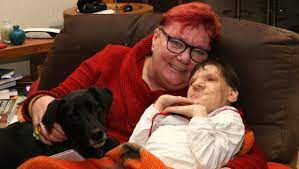Caregiving
What Is a Life Lived Entirely for Another?
Personal Perspective: For 37 years, she was a full-time caregiver.
Posted January 7, 2022 Reviewed by Davia Sills

One chilly, February day, as Johanne Powell was driven to the hospital to give birth, she looked out the car window and felt as if she were driving through the sun; the fields were ablaze with bright yellow gorse flowers.
“I look back on that moment because that was the last time I was really happy,” she told me with gentle solicitude.
When Siobhan (pronounced Chi-van) was born, Johanne glimpsed her tiny baby for only moments before her daughter was rushed from Ireland’s Waterford maternity hospital to the Ardkeen emergency room: a life connected to wires and machines, housed in a protective bubble.
Siobhan’s DNA had snapped and reattached unnaturally; a deformed link cascaded, skewing creation, leaving Siobhan the only known living girl to have Ring Chromosome-8. The doctors told Johanne that if Siobhan lived past her first year, then she would be severely mentally and physically handicapped.
Ring Chromosome-8 was discovered at the turn of the century by Lillian Morgan, a woman who boldly bucked societal expectations, raised four kids, and supported her husband, all while running her own science experiments and starting a school. Lillian Morgan had the kind of independent, progressive life Johanne hoped to emulate, but which would be nearly impossible with the full-time care Siobhan would need.
They were far from town. Johanne’s husband, Alan, worked on tankers, navigating the seas for weeks at a time. Alone except for her mother-in-law, who stopped by regularly to give Johanne a break for grocery shopping or a walk, there was no one to comfort her as she wept daily for “the daughter she had and the daughter she didn’t have.” Grief became depression became despair. Just as Odysseus’s Penelope held to her convictions, Johanne cared steadfastly for her fragile daughter, weaving hope even as the stitches frayed.
During her first year, Siobhan had kidney infections that, without special treatment, would have killed her. She also began having epileptic seizures.
Siobhan would never walk, never talk, never wipe herself, never feed herself. Johanne shed her ambitions, coped with the solitary, consuming task of unremitting care by retreating into her head, existing within her thoughts.
Johanne was not religious but was born with a strong sense of right and wrong. Years after Siobhan’s birth, she realized she had a gift of describing her experience with a blunt, human charm. She began to speak publicly about her experience.
“People would tell me, ‘God gave you a child like Siobhan because you can handle it.’ I always tell them where to stick it up their arse. I’m not designed to handle this. I don’t want it. I didn’t ask for it. I do it because there’s no other choice. Caring for Siobhan was left up to me, and that is not what I am good at doing… at all.”
Her straightforwardness was captivating. She was invited to The Late, Late Show, where she told the host and studio audience, “I'm tired of her. I'm bored out of my tree here. I'm doing the same thing as I did 30 years ago. I'm changing nappies. When you have a baby, when they do things, reach milestones, the first time, it's exciting. I tell you, the 153,000th time you've changed a nappy, there isn't much excitement, and the same [goes for] playing with them or feeding, nothing changes.”
She was interviewed in newspapers like the Daily Mail and Irish Times. She found that she was no longer speaking only for herself, but for home-carers in general, which, by some estimates, accounted for one-tenth of Ireland. She became a board member of the National Carer’s Association while adorning the cover of a powerful booklet, "Paying The Price: The Physical, Mental and Psychological Impact of Caring." Johanne began directing her criticism toward the system of care Siobhan was receiving. “We were let down badly by the Irish government because they made it harder for us to enjoy ourselves. Leaving Siobhan in an old folks' home is wrong. She also shouldn’t be living at home with me and Alan. Siobhan’s an adult now. She should be with people her own age, enjoying life. We all should.”
Thirty-seven years of dedicated care and activism ended abruptly when Siobhan died.
Three years ago, when I first interviewed Johanne, she was a lively woman with red hair, whose light blue eyes shone with a wan mischievousness. After the death of Siobhan, she has let her hair go silvery-white, her tone has become somber, the unstoppable preacher muted, the urgency of the advocate softened. During our first interview, she told me that if she wasn’t a full-time home caregiver she would get a Master's in psychology, travel the world. Now, she says that she is 68 and too old to make a difference.
“I have lost the thing that gave my life meaning,” she said.
“People who have recently lost someone have a certain look,” Joan Didion wrote in The Year of Magical Thinking, her book about loss and grief. “The look is one of extreme vulnerability, nakedness, openness… These people who have lost someone look naked because they think themselves invisible.”
Johanne is not as visible as she once was, but she is also not entirely invisible. She still gets e-mails from full-time carers who have heard her speak, thanking her for her activism, for making them feel less alone, less guilty for their own doubts and frustrations.
She is not bitter over the life she could have had. She is not resentful. “I spent my life doing something I didn’t choose and something that I’m not very good at, instead of spending my life doing something that I would get more enjoyment out of.”
“You have to let the grief be part of you. Siobhan is part of us. She was part of us in life and part of us in death. It will never be anything else. I never want it to be anything else. I never want to forget. I never want to get over the grief of having lost her. It’s like life. You don’t know what is sweet until you taste it. You don’t know grief unless you’ve had pleasure. You need to know what you’ve lost in order to recognize what you have now.”
She says that the last time she was happy was driving through those gorse fields of bright yellow. But there was the first time when, sitting next to her on the couch, Siobhan reached out and touched her face. And there were the moments when Johanne was getting dressed, and Siobhan would insist on getting under her mother's jumper just so she could be close to her skin.
“Such a lovely feeling that,” Johanne said with an uninflected wistfulness.
Johanne gave her life for Siobhan, and now that Siobhan is gone, she says she can feel good about herself. A clear conscience is the best coping mechanism.
The experience of the last 37 years overcame Johanne entirely when, just after Siobhan died, the coroners offered to carry her to her coffin. Alan intervened, saying, “I carried her so many times in her life; let me do it one last time.”
With Siobhan’s small, lifeless body in his arms, Johanne felt her grief and loss completely, gazing upon the two people in her life that she loved the most, understanding that nothing is ever really done in vain.




